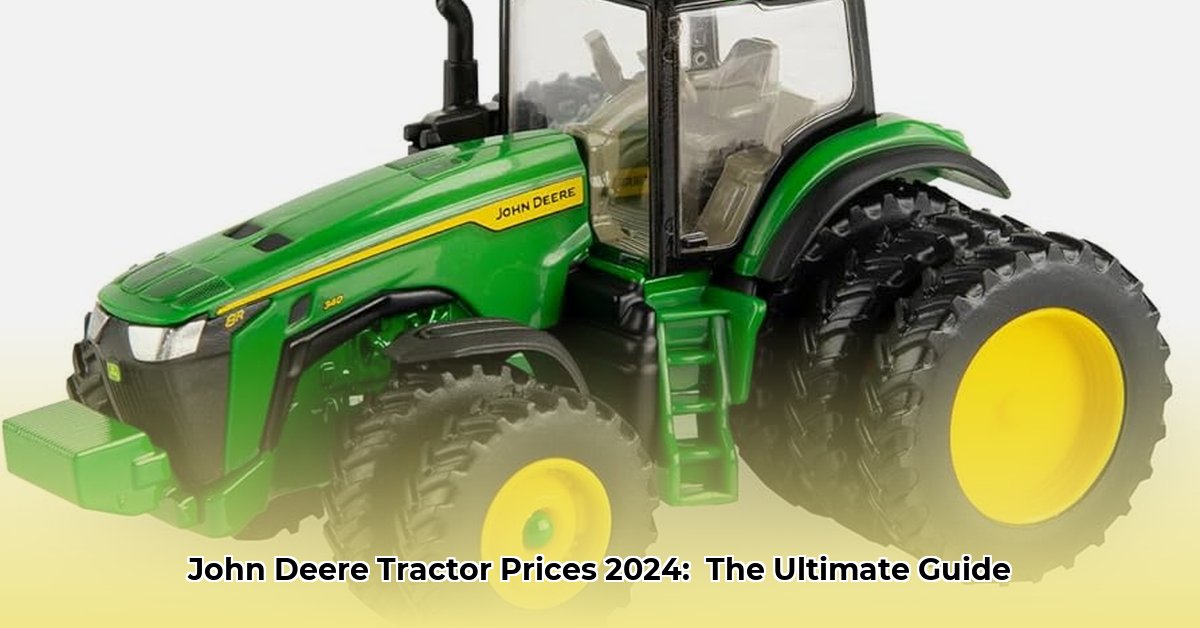
Thinking about purchasing a John Deere tractor? The price can vary significantly, depending on factors like model, horsepower, age, features, and condition. This comprehensive guide will help you navigate the complexities of John Deere tractor pricing and make an informed decision, whether you're a small-scale farmer or a large-scale operation. For example, check out this 25 HP model for smaller farms.
Decoding John Deere Tractor Prices: Factors Influencing Cost
The price of a John Deere tractor isn't simply a number; it's a reflection of numerous interconnected factors. Horsepower is a primary driver—smaller tractors, suitable for smaller farms or hobbyists, often start around $28,000 (USD equivalent). However, high-horsepower tracked tractors designed for large-scale operations can easily exceed $400,000. This significant price difference underscores the importance of carefully assessing your operational needs. Beyond horsepower, additional features such as advanced technology (GPS-guided planting, automatic steering) substantially increase the cost.
The used tractor market offers a potentially more affordable entry point, with prices ranging from $8,000 to $12,000 (USD equivalent). However, buying used requires thorough due diligence. A comprehensive inspection, including a review of the service history and operational hours, is crucial to avoid unforeseen repair expenses. A pre-purchase inspection by a qualified mechanic is highly recommended.
Financing Your John Deere Tractor: Making it Affordable
Securing financing is often a critical aspect of acquiring a John Deere tractor. John Deere Financial, along with other lenders, offers various financing plans to spread the cost over time. Interest rates typically range from 6% to 10%, spanning 36 to 60 months, though these figures can vary based on prevailing market conditions and your creditworthiness. Remember that the total cost encompasses more than just the interest rate. Compare the total cost including fees and the loan repayment period; a slightly higher interest rate with a shorter loan term might prove more economical in the long run. Always shop around and obtain multiple quotes before making a commitment.
Understanding John Deere's Market Segmentation: Finding the Right Fit
John Deere caters to a diverse range of farm sizes and operational needs, segmenting its market into compact, medium, and high-horsepower tractors. This segmentation reflects the varying requirements of farmers, from small hobby farms to large-scale commercial operations. Before starting your search, accurately assess your operation's size and the tasks you'll be undertaking. This will streamline your decision-making process, focusing your efforts on models specifically tailored to your demands.
Sustainability and the Future of John Deere Tractor Prices
Sustainability is no longer a peripheral concern; it's a central factor shaping the future of agriculture. Fuel efficiency and technological innovation are pivotal drivers in tractor evolution. Precision agriculture technologies, employing data and sensors to optimize resource allocation, are gaining prominence. These technologies directly translate into lower operational costs and a reduced environmental impact. Government regulations and subsidies also play a significant role, potentially influencing the overall cost by incentivizing the purchase of more eco-friendly models. Adapting to these evolving trends is essential for long-term success in modern farming.
Actionable Steps for Different Stakeholders
For Small-Scale Farmers:
- Prioritize Used Tractors: Consider purchasing a used tractor to minimize initial costs. Meticulously inspect its condition and service history.
- Explore Financing Options: Research various financing plans to spread payments over an extended period.
- Focus on Fuel Efficiency: Choose fuel-efficient models to reduce operational expenses over time.
- Seek Government Assistance: Investigate available subsidies and grants promoting sustainable farming practices.
For Large-Scale Farmers:
- Invest in High-Horsepower Models: Invest in high-horsepower models with advanced automation features to boost productivity.
- Negotiate Financing: Aggressively negotiate financing deals to secure favorable terms.
- Embrace Data-Driven Farming: Implement data-driven farming systems for optimized resource utilization.
- Explore Alternative Fuels: Research alternative fuel sources and explore options like biofuels, as they become more viable.
For John Deere:
- Enhance Used Tractor Transparency: Improve the transparency of used tractor history and condition.
- Develop Flexible Financing: Develop more adaptable financing plans tailored to diverse farming needs.
- Highlight Sustainability Features: Promote the sustainability features of your tractors, emphasizing long-term cost savings.
- Invest in R&D: Invest significantly in R&D for alternative fuels and precision technology.
For Governments:
- Offer Sustainable Agriculture Subsidies: Provide generous subsidies for fuel-efficient and technologically advanced tractors.
- Promote Collaboration: Foster collaboration between researchers and farmers to accelerate the adoption of precision agriculture.
- Implement Stricter Emission Standards: Enact stricter emission standards for agricultural machinery.
- Fund Sustainable Technology R&D: Fund research focused on sustainable agricultural technologies.
Beyond Price: Making the Right Choice
The purchase price is merely one aspect of the overall cost of ownership. Consider fuel consumption, maintenance expenses, repair costs, and potential resale value. A holistic evaluation, weighing initial investment against long-term benefits, is crucial. Making a well-informed decision will have a significant impact on your farm's future. Remember to consult with your local John Deere dealer for personalized advice and to thoroughly research financing options.